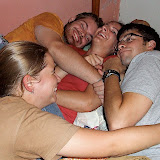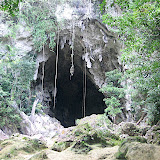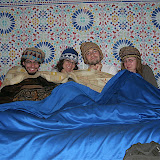Life back "Here"
I've been home for three weeks now and pretty much resumed life as normal, whatever that word means. I'm living at home for the summer, after living in different countries for the past 8 months. I'll have the three months here at home to try to process, for the time being, all my experiences from the other parts of the world in which I have lived and traveled.
For now, though, I would like to try to reflect in the way El Salvador has influenced my life here and how I perceive this country to which I hold an invaluable passport. As for all 24 of us in the program, we came back "shocked" by our culture after living four months in El Salvador; and in many ways, the United States has disgusted me while at the same time, I've been gaining a respect and appreciation for what this place has to offer. The idea of "luxury" still bothers me, after seeing so many people with so few possessions. We've come to a point where value is completely reversed, where goals are inverted. Some of my professors in Spain communicated the Spanish way of life: work only hard enough to enjoy life. As I told my friend, that's in the right direction. We get so caught up with work towards the goal of making money and "moving up" in society. Success is completely based on your bank account and how much prestige you can garner. We're obsessed at having the "best" things possible, and this is very tough for me to get over. We "deserve" these best things because of how "hard" we work, evidently. But do we deserve this things that much more than the majority of people on this earth?
So many people are dying (literally) to enter, and I was so quick to leave. The migration between the United States, Mexico, and Central America formed a large part of my experience in El Salvador, and I believe that it will continue to affect my life here in the US. El Salvador, as I and all of my friends in El Salvador have said, is a country of opposites: a giant, sick dichotomy. It is controlled by 14 unimaginably rich families, in business and government, and a huge class of the Salvadoran population is direly poor and growing more destitute. Just to give you an idea, the UN puts El Salvador somewhere in the middle of world countries in terms of economic strength, so it does not look like Haiti or other intensely poor places. Living costs continue to rise there, especially after the recent adoption of the US dollar, but salaries are not increasing at any profound rate. In fact, many adults and young people often told me the biggest root cause of the country's problems is lack of employment. We spoke with many youths in high school, college, and recently graduated young adults, and they told us that more often than not, a normal person (not of the upper crust) cannot find a job in the area in which they were trained: a lawyer opening up a stand in the market, a business school graduate selling mangoes from a basket on her head--these are not uncommon stories. The violence is out of hand, as well. The UN lists the country as one of the most violent in the world, behind Iraq, of course. It has a terrible history of police violence, especially death squads and extra-judicial killings, since the 1970s. It passed through 15-ish years of horrible civil war, only to enter the 90s and continue today with a surging level of violence. Gangs control much of the country now, and lame attempts from the government have only hardened gang organization and encouraged them to enter into more organized crime, especially drug trafficking.
People are leaving the country for the United States, almost 700 per day (many are repeat attempts to enter the US). There are villages with almost no men between the ages of 15 and 50. We were told by countless individuals that they don't want to leave, to flee everything you know and all the people you love, for a $7000 attempt (that's the cost of emigrating, just once) to work for better wages (the minimum wage is around $150 per month, and many jobs don't pay that). Families fall apart, children enter gangs, children have to leave school to beg or find some form of employment. And the cycle continues.
I have the opportunity to do whatever I want with my life, as I've been told for so many years. What a huge opportunity that is for me. A blessing of God. I was born here, to this family, in this country, for no doing of mine. There's no way that I deserve this as opposed to the very-talented Tomás with whom I stayed in the campo. I can walk around my neighborhood after dark and not fear violence from a nearby gang member. My parents can take days off work and not fear that their kids will go hungry. What do I do with all this privilege?
From my reflections thus far, I've taken away some key things from El Salvador. Thankfulness. We all have so much to be thankful for--I know this sounds trite. I'll list some of mine: housing, healthcare, education, employment, family, and it continues. A need to help others to comprehend the world situation. The US has oppressed countries and peoples for centuries, and it continues to do so. We continue to do so. Yes, it's a horrendous system that we can't help but support, but we can do what we can. Each person has the opportunity to choose for him/herself how s/he wants to deal with this reality: turn and run and ignore or stop and fight and struggle. I don't know yet how I'm going to do it, really, but at this point, it's about small life choices and daily realizations. We are a country of waste, a country of excess, and I'm a representation of this at many times. However, we as youths have the choice of continuing this legacy or creating a new one of our own: defining what we understand as success, how we choose to devote our time, and what money means to us. We can do something about this self-perpetuating system that tells us how we need to act and what we need to value.
Yes, I'm being idealistic. Yes, I'll talk about it pessimistically. But yes, we have to do something. The world is falling apart around us, and this is not only limited to El Salvador. We've gone away from what life really means and to what we should devote our lives.
Thanks for reading, thanks for caring, and thanks for trying. I love you all.
For now, though, I would like to try to reflect in the way El Salvador has influenced my life here and how I perceive this country to which I hold an invaluable passport. As for all 24 of us in the program, we came back "shocked" by our culture after living four months in El Salvador; and in many ways, the United States has disgusted me while at the same time, I've been gaining a respect and appreciation for what this place has to offer. The idea of "luxury" still bothers me, after seeing so many people with so few possessions. We've come to a point where value is completely reversed, where goals are inverted. Some of my professors in Spain communicated the Spanish way of life: work only hard enough to enjoy life. As I told my friend, that's in the right direction. We get so caught up with work towards the goal of making money and "moving up" in society. Success is completely based on your bank account and how much prestige you can garner. We're obsessed at having the "best" things possible, and this is very tough for me to get over. We "deserve" these best things because of how "hard" we work, evidently. But do we deserve this things that much more than the majority of people on this earth?
So many people are dying (literally) to enter, and I was so quick to leave. The migration between the United States, Mexico, and Central America formed a large part of my experience in El Salvador, and I believe that it will continue to affect my life here in the US. El Salvador, as I and all of my friends in El Salvador have said, is a country of opposites: a giant, sick dichotomy. It is controlled by 14 unimaginably rich families, in business and government, and a huge class of the Salvadoran population is direly poor and growing more destitute. Just to give you an idea, the UN puts El Salvador somewhere in the middle of world countries in terms of economic strength, so it does not look like Haiti or other intensely poor places. Living costs continue to rise there, especially after the recent adoption of the US dollar, but salaries are not increasing at any profound rate. In fact, many adults and young people often told me the biggest root cause of the country's problems is lack of employment. We spoke with many youths in high school, college, and recently graduated young adults, and they told us that more often than not, a normal person (not of the upper crust) cannot find a job in the area in which they were trained: a lawyer opening up a stand in the market, a business school graduate selling mangoes from a basket on her head--these are not uncommon stories. The violence is out of hand, as well. The UN lists the country as one of the most violent in the world, behind Iraq, of course. It has a terrible history of police violence, especially death squads and extra-judicial killings, since the 1970s. It passed through 15-ish years of horrible civil war, only to enter the 90s and continue today with a surging level of violence. Gangs control much of the country now, and lame attempts from the government have only hardened gang organization and encouraged them to enter into more organized crime, especially drug trafficking.
People are leaving the country for the United States, almost 700 per day (many are repeat attempts to enter the US). There are villages with almost no men between the ages of 15 and 50. We were told by countless individuals that they don't want to leave, to flee everything you know and all the people you love, for a $7000 attempt (that's the cost of emigrating, just once) to work for better wages (the minimum wage is around $150 per month, and many jobs don't pay that). Families fall apart, children enter gangs, children have to leave school to beg or find some form of employment. And the cycle continues.
I have the opportunity to do whatever I want with my life, as I've been told for so many years. What a huge opportunity that is for me. A blessing of God. I was born here, to this family, in this country, for no doing of mine. There's no way that I deserve this as opposed to the very-talented Tomás with whom I stayed in the campo. I can walk around my neighborhood after dark and not fear violence from a nearby gang member. My parents can take days off work and not fear that their kids will go hungry. What do I do with all this privilege?
From my reflections thus far, I've taken away some key things from El Salvador. Thankfulness. We all have so much to be thankful for--I know this sounds trite. I'll list some of mine: housing, healthcare, education, employment, family, and it continues. A need to help others to comprehend the world situation. The US has oppressed countries and peoples for centuries, and it continues to do so. We continue to do so. Yes, it's a horrendous system that we can't help but support, but we can do what we can. Each person has the opportunity to choose for him/herself how s/he wants to deal with this reality: turn and run and ignore or stop and fight and struggle. I don't know yet how I'm going to do it, really, but at this point, it's about small life choices and daily realizations. We are a country of waste, a country of excess, and I'm a representation of this at many times. However, we as youths have the choice of continuing this legacy or creating a new one of our own: defining what we understand as success, how we choose to devote our time, and what money means to us. We can do something about this self-perpetuating system that tells us how we need to act and what we need to value.
Yes, I'm being idealistic. Yes, I'll talk about it pessimistically. But yes, we have to do something. The world is falling apart around us, and this is not only limited to El Salvador. We've gone away from what life really means and to what we should devote our lives.
Thanks for reading, thanks for caring, and thanks for trying. I love you all.







